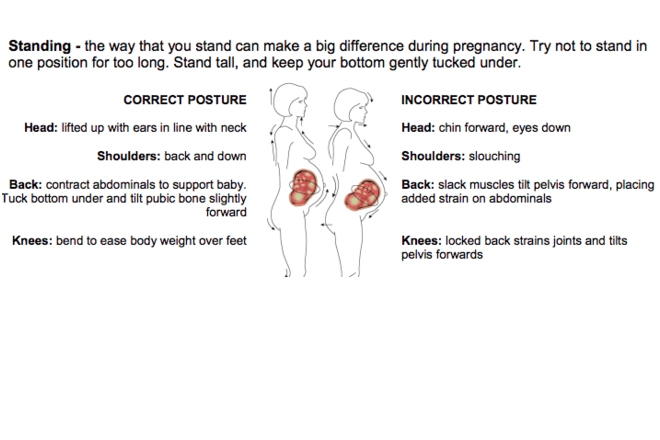Find out what to expect, inside and out, now that you're 23 weeks pregnant and into the last few weeks of your second trimester. Plus, why sitting and standing correctly will do you a big favour as your bump continues to get bigger, and heavier!
This page contains affiliate links, which means we may earn a small amount of money if a reader clicks through and makes a purchase. All our articles and reviews are written independently by the Netmums editorial team.
What’s happening at 23 weeks?
Here are the key things you can expect from your pregnancy at this stage:
- Your baby is starting to look much more like a newborn.
- You may notice increased appetite, but it's still not time to increase your calories.
- You may feel like you've got a permanent cold.
- Bad posture can creep in; make sure you know how to sit and stand correctly.
How big is your baby?
This week, your baby's the size of a sharing bag of marshmallows and weighs around 501g – that’s nearly a whole pound, or around the size of half a standard bag of sugar.
In fact, your baby now weighs more than the placenta, which will keep growing throughout your pregnancy but not as fast as your baby. The amniotic fluid and all the extra fluid in your body pack some serious weight too; no wonder if you're feeling knackered a lot of the time!
FREE NEWBORN NAPPIES
Your little one measures around 28.9cm from top to toe and is looking increasingly like a newborn now that the skin has plumped up a little more. This is because your baby is still gaining weight; as fat builds up beneath the skin, baby gets less wrinkled and more smooth-skinned.
Your baby's eyes are fully formed now, and their ears and hearing are developing too. At this stage, it's thought that babies can hear loud noises and may even flinch if you sneeze!
What's going on with your body?
Don't be surprised if you're feeling ravenous this week. Your body is busy providing nutrients for your baby and even starting to make colostrum, the rich first milk for your baby.
Although eating well is important, remember that you don't need to be eating for two. Try eating little and often throughout the day. These healthy snacks are the perfect way to deal with the munchies, instead of reaching for a fast-food fix.
Don't beat yourself up about those ice cream cravings , though. It's always fine to have sweet treats in moderation, and you've certainly earned it! Just try to make the majority of your meals and snacks healthy ones.
You may also be feeling blocked up , as if you've got a permanent cold. Don't worry, it's perfectly normal. Oestrogen causes an increase in mucous production, so you can blame those pesky pregnancy hormones again. The same thing can often cause snoring in pregnancy.
Once you've had the baby you'll be able to breathe a lot easier again. In the meantime, you could ask a pharmacist for saline drops to clear your blocked nose.
Always check with a pharmacist before using over-the-counter medications during pregnancy, as they may not all be safe for your developing baby.
Feeling twinges around your ribs ? Your ribcage expands a bit in the latter half of pregnancy, to make room as your baby starts to push your other organs upward. Many babies also seem to love kicking their mum's ribs for some reason! As with any pregnancy pain, talk to your midwife if it's severe.
What to expect this week: bad posture
Your baby may only weigh as much as a bag of sugar, but it probably feels a lot heavier to you! As your bump grows, keep an eye on your posture to avoid backache kicking in from the extra weight you're carrying.
NHS Norfolk and Norwich University Hospitals offers these tips for good posture in pregnancy:
The way that you stand can make a big difference to how you feel during pregnancy. Try not to stand in one position for too long. Stand tall, and keep your bottom gently tucked under.
When you're sitting down, it may help to have a wedge or lower back cushion in your car or at your desk to give you some added support.
As tempting as it is to slump on the sofa after a long day, it won't do your back any favours.
Try using cushions to support your back and have your feet resting on the floor. It may help to stretch out and lie on your side if you are watching TV or relaxing.
When sitting up, tilt your pelvis forward to keep your back straight. When standing up, there should be a straight line from your ears, through your shoulders, back and kness.
And be careful getting in and out of bed as your bump gets bigger. Follow these NHS-recommended steps to do it safely and comfortably:
- Try rolling onto your side, making sure to move your shoulders, hips and knees at the same time - like rolling a log.
- Let your legs ease off the edge of the bed toward the floor. At the same time, use your arms to push yourself up into a sitting position. Doing this as one movement can be more comfortable.
- To get into bed, just reverse this movement.
What to do this week: understand maternity leave and pay
If you haven’t already told your employer that you’re pregnant and planning to take maternity leave, you’ll need to do it very soon. It has to be done, in writing, at least 15 weeks before your due date.
If you’ve been in continuous employment with the same company for 26 weeks or more, up to and including this week, you’ll be entitled to statutory maternity pay (SMP). If this is the case, you’ll officially qualify for maternity leave.
Now’s the time to start thinking about what maternity leave you want to take and when you want to start it.
Statutory maternity leave lasts 52 weeks and you’re eligible for statutory maternity pay (SMP) for up to 39 weeks. The first 26 weeks is known as ‘Ordinary Maternity Leave’, the last 26 weeks as ‘Additional Maternity Leave’. You can expect to get:
- 90% of your average weekly earnings before tax for the first 6 weeks
- £151.20 or 90% of their AWE (whichever is lower) for the remaining 33 weeks
Of course, your company may have its own policy and offer more money.
You'll need to tell your employer when you want to stop work and the day you want your SMP to start. You must give at least 28 days notice and proof that you’re pregnant with either a letter from your doctor or a MATB1 form, which you can get from your GP or midwife from around 20 weeks.
Don't worry if you're not eligible for statutory maternity leave. If you've not been working at a company long enough to qualify for SMP or are self-employed, you might be eligible for something called maternity allowance instead.
You can also opt for shared parental leave , where your partner can use some or all of the leave after the birth to stay at home and care for your baby. Who should stay home is a very personal decision, affected by many things such as how much you and your partner earn, future career aspirations, and of course, who wants most to stay home with the baby!
Learn all you need to know about maternity and paternity allowances and benefits.
Your 23 week to-do list
1 Make sure you're eating sensibly still by reading our guide to keeping a healthy weight in pregnancy.
2 Shoulders back ... keep tabs on your posture. Little changes can make a big difference to those pregnancy-related aches and pains.
3 Get your MATB1 form from your GP or midwife, if you haven't already. Make a photocopy and give it to your employer.
4 Put your request to take maternity leave in writing for your employer, as soon as possible.
5 Don't forget those all-important pelvic floor exercises!
What to watch this week...
Get expert tips on what to expect at 23 weeks pregnant from our midwife.
What happens next week...
Want to know what happens when you're 24 weeks pregnant ? Or do you need to remind yourself what you read last week ? Just click on the numbers above to find out more about what to expect when you're that number of weeks pregnant.








